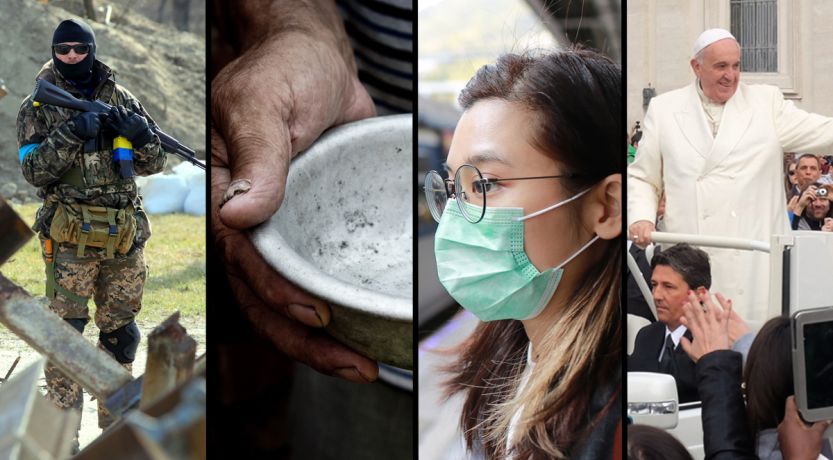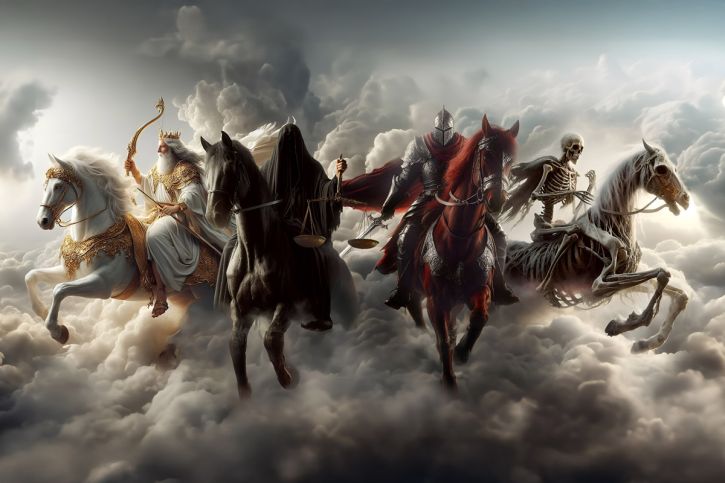Are the Four Horsemen of Revelation Riding Today?
Recent events in our world have stirred many people’s interest in Bible prophecy. Where do current events fit in the end-time prophecies of the Bible?

We live in a world filled with turmoil and uncertainty. Many people sense that our world is in the midst of significant upheavals.
One of the most famous prophecies in the Bible is the ominous ride of the four horsemen of the Apocalypse. As we’ve explained many times on this site, the four horsemen ride the white horse (religious deception), the red horse (wars and rumors of wars), the black horse (famines) and the pale horse (pestilence and death). If you are not familiar with these four horsemen, read “What Are the Four Horsemen of the Apocalypse?”
Though the trends these horsemen represent have been on the world stage for a long time, they will escalate in intensity and impact during the end times. But, as terrible as they are, Jesus called them only “the beginning of sorrows” (Matthew 24:8).
President Joe Biden recently authorized Ukraine to use U.S. weapons to strike military targets within Russia, a move previously denied for fear of increasing the tension between the U.S. and Russia. In response, Russia has updated its nuclear doctrine to permit the use of nuclear weapons in response to conventional attacks from states supported by nuclear-armed nations.
Russian President Vladimir Putin increasingly views the war as a conflict between global powers and Russia, suggesting that he may justify use of nuclear weapons as self-defense. This is not the first time Putin has invoked the specter of nuclear warfare, a threat that has alarmed many nations.
To send a warning message, Russia fired a nuclear-capable intermediate-range ballistic missile at Ukraine. Though the missile was carrying only a conventional warhead, many fear this could be a precursor to a future nuclear attack. Meanwhile, NATO is making war preparations in the event of further escalation.
We are seeing “rumors of war” amid a war.
Are the rides of the four horsemen beginning to escalate? Let’s examine the horsemen in light of recent events in our world.
An artistic rendition of the four horsemen of Revelation highlights the events to come in the end time.
The red horse of war
The rider of the red horse is described as one who has a “great sword” to “take peace from the earth, and that people should kill one another” (Revelation 6:4). Jesus described it this way: “And you will hear of wars and rumors of wars” and “nation will rise against nation, and kingdom against kingdom” (Matthew 24:6-7).
The recent escalation in the Russia-Ukraine war has left many, particularly in Europe, on edge. The ongoing Middle East crisis and China’s military posturing in the Pacific are adding to global instability, with tensions approaching all-time highs. Many fear these escalating events could lead to a multifront world war.
For more insight on that, read “Will There Be a World War 3?”
The ongoing Middle East crisis and China’s military posturing in the Pacific are adding to global instability, with tensions approaching all-time highs.
Europe sees itself as reacting to events instead of controlling them. After the recent U.S. elections, many European leaders met in Budapest to discuss Europe’s future. French President Emmanuel Macron addressed the delegates and said, “This is a decisive moment in history for us Europeans.”
He asked the audience: “Do we want to read the history written by others—the wars launched by Vladimir Putin, the U.S. election, China’s technological or trade choices?”
He encouraged European leaders to instead write their “own history.” President Macron shares the vision of the EU’s founders, which is that Europe should join together through crises and become a leading force on the world stage.
Could this be the crisis that will inspire Europe to unite in the spirit of Jean Monnet, one of the EU’s founders? He said, “Europe will be forged in crises, and will be the sum of the solutions adopted for those crises.”
In the Middle East, Israel has been engaged in a multifront war, battling Hamas in Gaza, Hezbollah in Lebanon, the Houthis in Yemen, Iranian-backed militias in Syria and Iraq, as well as Iran itself, which supports all these groups. Determined to neutralize these threats, Israel is striking its adversaries wherever it deems necessary to ensure Israel’s security and survival.
Since the conflict primarily involves Shia-aligned forces, Sunni-majority nations have refrained from direct military involvement but have publicly condemned the war.
Could the elimination of the Shia threat against Israel create a power vacuum in the Middle East that could be filled by a Sunni-led Islamic bloc? The Bible warns that to the south of Israel a power known as “the king of the South” will rise again in the end times. (To learn more, read “The King of the South.”)
Historically recognized as this prophetic king of the South, Egypt is a nation to watch closely, especially as it faces a convergence of crises.
First, the COVID-19 pandemic severely affected Egypt’s vital tourism industry. This was compounded by the Russia-Ukraine war, which caused grain prices to surge, and the ongoing Israel-Gaza conflict, which also disrupted tourism. Furthermore, Houthi attacks on vessels in the Red Sea have significantly disrupted traffic through the Suez Canal, depriving Egypt of billions in revenue.
In addition, tensions between Egypt and Ethiopia have escalated over the Grand Ethiopian Renaissance Dam (GERD), which threatens Egypt’s access to the water of the Nile—critical for its survival. The dispute has led to fears of a broader regional conflict that could potentially involve neighboring countries, like Somalia and Eritrea. This standoff risks destabilizing an already volatile region.
On the other side of the world, China’s incursions into Taiwan’s territory continue to be a concern. And Taiwan is not alone in feeling threatened. Japan has also criticized China for sending spy military aircraft into its airspace, calling it a “serious violation” of its sovereignty and a national security threat.
The U.S.-led international order, which has provided global stability since the 1940s, faces growing challenges from nations seeking a world free from American dominance.
Meanwhile, North Korea, in defiance of the United Nations, threatened to speed up its nuclear weapons program. It also recently signed a new military treaty with Russia. Under this agreement, North Korea has deployed troops to support Russia in its conflict with Ukraine, while Russia has pledged to assist North Korea in achieving its military goals and to provide support if the hermit nation is attacked.
The Bible shows that three major regional powers will dominate the world in the end time:
- The king of the North, a revived Roman Empire centered in Europe.
- The king of the South, likely a confederation of Muslim nations that will attack the king of the North and then be counterattacked and defeated.
- The kings of the East, likely led by Russia and China, who will attack the king of the North.
Do you notice that a power bloc is missing?
The English-speaking nations, led by the United States and the United Kingdom, are missing in the end-time geopolitical landscape. The U.S. and U.K. in particular have maintained the global order for over 200 years. But Bible prophecy shows these two nations will be rendered powerless before the end times—largely as punishment for their national sins. To learn more, read “What Will Happen to America?”
While the recent election results may lead to some shifts, the United States will likely continue prioritizing domestic issues over foreign policy, leading to further isolation. The U.S.-led international order, which has provided global stability since the 1940s, faces growing challenges from nations seeking a world free from American dominance.
The United States is increasingly seen as a nation weakened by deep internal polarization, not a mighty unified superpower. As U.S. influence wanes, other powers are stepping in to fill the void.
The impact of warfare goes far beyond just the loss of human life. Wars also have a significant impact on food supplies. Russia and Ukraine account for a third of the world’s wheat and barley exports, and Russia is the leading supplier of fertilizers, on which much industrial food production depends.
Disruptions in food supplies can also lead to war. Consider the Arab Spring. In Egypt, the rise of the price of wheat led to uprisings that toppled Hosni Mubarak’s government. The rising food prices have a real risk of causing major unrest in North Africa and the Middle East.
This naturally leads us to the next horseman—the black horse of famine.
The black horse of famines
In Matthew 24:7 Jesus warned of “famines.” This is described in Revelation as a black horse with its rider holding a pair of scales, depicting major shortages (Revelation 6:5-6).
There is probably not a person reading this who hasn’t noticed price increases on almost everything we buy. Inflation is pushing the price of goods up, and in a circular and interdependent economy, a rise in the price of one product has ripple effects on the prices of other products and will ultimately be felt by the consumer.
Currently, one of the major drivers of inflation is the rising price of oil. Nearly all transport systems are dependent on oil. So this single commodity affects the price of almost everything.
But that alone does not explain all the causes of today’s inflation. Many of the Western nations enacted massive spending programs to deal with the economic fallout of the COVID-19 pandemic and lockdowns. The enormous spending caused inflationary pressures, driving up the costs of goods.
Economic instability, inflation and food scarcity can also lead to political and social instability within nations.
For the first time, annual interest payments on the United States’ $35 trillion debt have exceeded $1 trillion. Historian Niall Ferguson recently noted that historically no great power has maintained its dominance once its interest payments surpassed its military spending. He cautioned that unless the United States alters its trajectory, it risks following the fate of past empires.
A collapse of the U.S. economy would have catastrophic global consequences. It would disrupt international trade and financial systems, triggering widespread economic instability. The resulting breakdown in supply chains could lead to mass starvation in vulnerable regions, exacerbating humanitarian crises on an unprecedented scale. The ripple effects of such a collapse cannot be overstated.
Economic instability, inflation and food scarcity can also lead to political and social instability within nations.
The prophecy of the black horse specifically mentions huge price increases for wheat and barley (Revelation 6:6). We can expect to pay more for a loaf of bread and other food necessities.
But the worst famine of all is described by the prophet Amos. He prophesied of a coming famine “of hearing the words of the LORD” (Amos 8:11). Though they now have access to the Bible, more and more people will refuse to hear, read or respond to it.
We are seeing this famine getting worse and worse in our Western societies as people are increasingly ignorant of and hostile toward the Bible. Studies show that even people who attend church regularly don’t read the Bible.
For more insight into this problem, read “Judeo-Christian Values Under Attack: What Can You Do About It?”
The pale horse of death
The pale horse and its rider, named Death, will take the lives of a quarter of the earth’s population. This occurs as a result of war and hunger, as well as pestilences and natural disasters (Revelation 6:8; Matthew 24:7).
The world has recently witnessed major disease outbreaks, notably the COVID-19 pandemic. But other diseases—such as MERS, SARS, bird flu, swine flu and Ebola—continue to spread and take lives.
The COVID-19 pandemic will pale in comparison to the pandemics that will come when the pale horse’s ride intensifies.
These are all classed as zoonotic viruses, which means they were transmitted to humans from animals. Interestingly, the book of Revelation says that the rider of the pale horse will kill not only by sword and hunger but “by the beasts of the earth” (Revelation 6:8). While this may refer to animal attacks, it could also refer to deaths from diseases that originate in animals.
The COVID-19 pandemic will pale in comparison to the pandemics that will come when the pale horse’s ride intensifies.
For more insight, read “Is Coronavirus an End-Time Plague?” and “Why the Surge in Infectious Diseases?”
The white horse of deception
Wars, famines and pandemics are easy to see and document throughout history. But many miss the significance of the first horseman—the rider of the white horse. The white horse often gallops invisibly, with the effects of its rider not always as obvious.
What is this white horse?
The white horse and its rider represent false religion.
In the Bible, the color white often represents righteousness (Isaiah 1:18; Revelation 3:5). Jesus is pictured as returning on a white horse with a powerful sword (Revelation 19:11-15). But the rider of this white horse carries a bow (a weapon that uses arrows, which are associated with Satan, Ephesians 6:16).
The white horse represents a counterfeit Christ, a figure who masquerades as Christian, but is actually from Satan.
The white horse represents a counterfeit Christ, a figure who masquerades as Christian, but is actually from Satan. The counterfeit Christianity is described in Revelation as one that looks like a lamb (another symbol of Christ) but speaks like a dragon (Revelation 13:11).
History shows that before the collapse of the Roman Empire, a new religious power rose to prominence from within the empire: the Roman Catholic Church. Out of this religious body came many protesting daughter denominations. To learn more, read “The End-Time Ride of the White Horse of Revelation.”
The current pope has been actively presenting himself as a humble servant of the poor, but he represents a church that teaches and practices many things in direct contradiction to the Bible. In addition to the historical false doctrines taught by the Catholic Church, the current pope has made other statements that contradict the Scriptures in other ways:
- In November 2024 Pope Francis appointed a homosexual-affirming priest who portrayed Jonathan and David’s relationship as homosexual as well as the relationship of the centurion and his servant in Matthew 8:5-10.
- In September 2024 Pope Francis said “all religions are a path to God” and that “divine inspiration [is] present in every faith.”
- In December 2023 Pope Francis urged world religions to unite to combat environmental devastation. In the same month, he authorized priests to bless same-sex couples under certain circumstances.
- In December 2021 Pope Francis said “sins of the flesh” aren’t that “serious.”
- In December 2015 Pope Francis stated that “Jesus probably had to beg forgiveness of His parents” for staying in Jerusalem when His parents were looking for Him.
- In October 2014 he said that evolution was not inconsistent with belief in God.
- In September 2013 Pope Francis assured atheists that they didn’t have to believe in God to be saved.
Watch for the Vatican to take a more prominent role in world affairs, especially in Europe and the Middle East. Recently, the pope called for an investigation of Israel for the allegation of genocide.
The Bible describes this religion as a “great city” that “reigns over the kings of the earth” (Revelation 17:18).
The Roman Church has historically involved itself in Europe’s political affairs, and will increasingly try to do that more in the coming years..
In addition to that, this religious power—and other religious figures—will gain greater prominence and influence by performing miracles that appear to be from God, but are actually from Satan (Matthew 24:24; 2 Thessalonians 2:9).
The Horseman will end the four horsemen
If left unchecked, all these forces could lead to humanity’s destruction. But God will not allow that to happen. He will send Jesus back to this earth to save us from ourselves. The return of the Son of God—who is depicted as the Horseman, with a sword, on the real white horse (Revelation 19:11-21)—will end the rides of the four horsemen of war, famine, pestilence and false religion.
Until then, Jesus admonishes His disciples to “watch therefore, and pray always that you may be counted worthy to escape all these things that will come to pass, and to stand before the Son of Man” (Luke 21:36).
Keep watching and praying!

Photo credit: LHT staff using AI.
Date Posted: December 11, 2024



